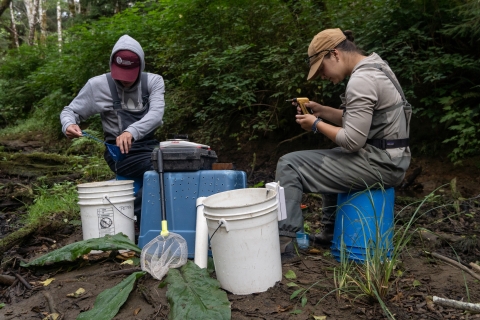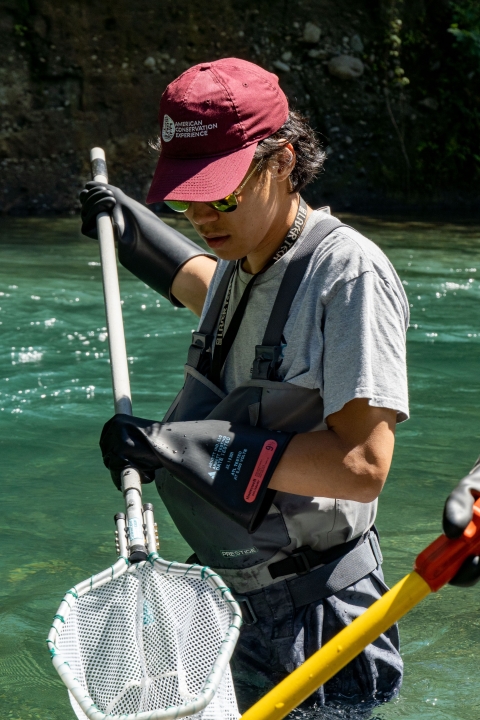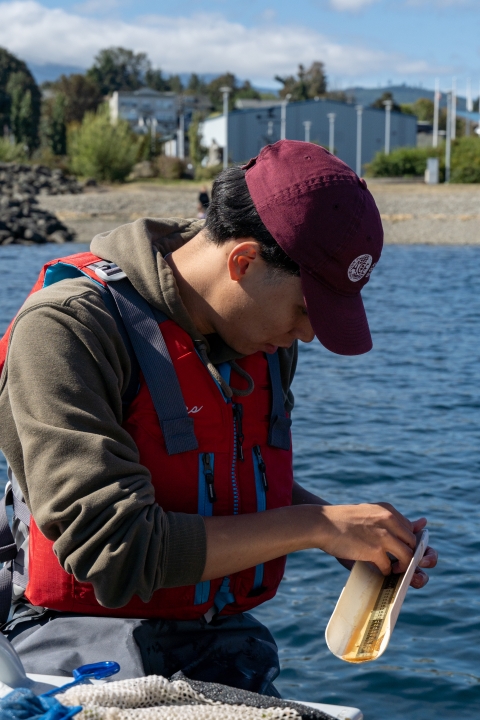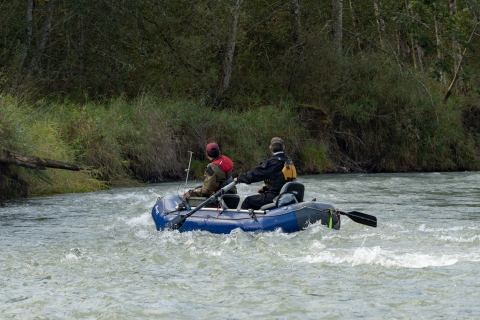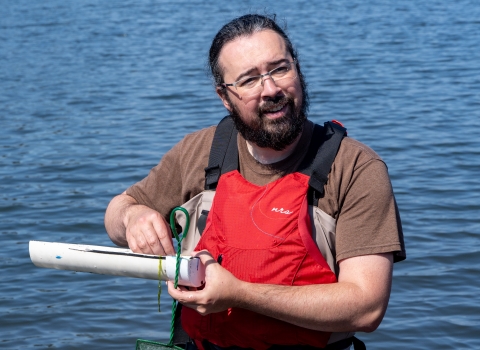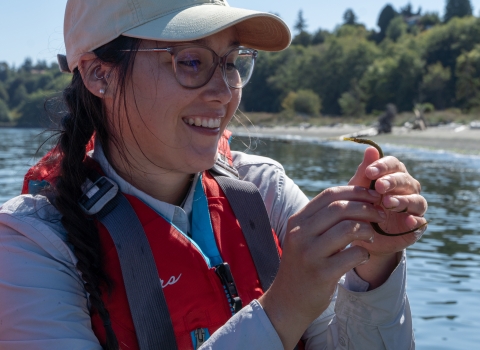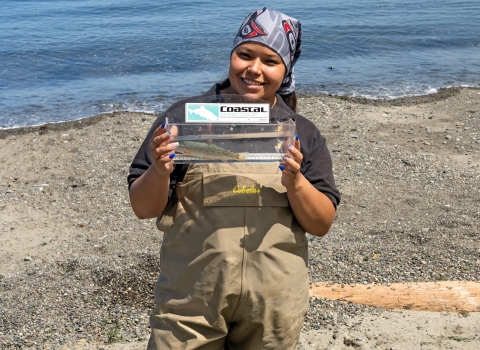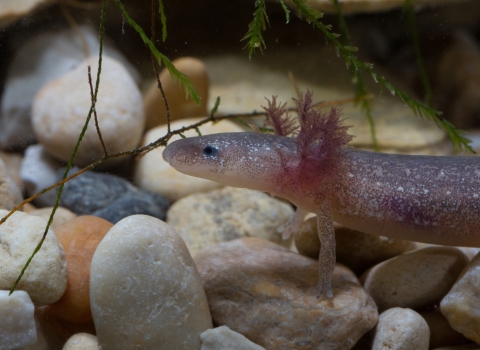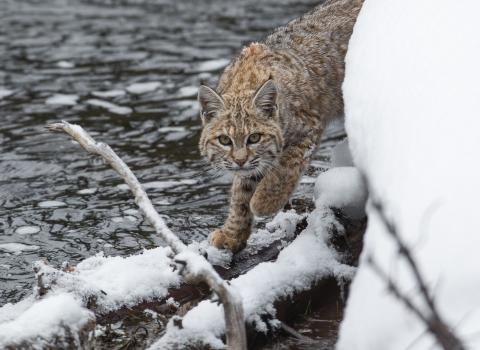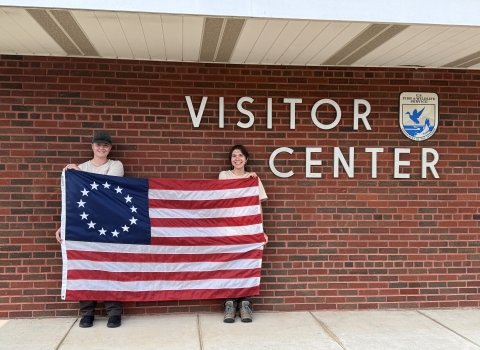The room was full of people intently staring into microscopes; only the noise of metal forceps tapping on plastic petri dishes broke the silence. The scent of formaldehyde faintly hung in the air. I found myself sitting in front of a microscope unable to resist peering in. In front of me sat an Alaskan bairdi crab, it seemed to look me back in the eyes despite being preserved. Little did I know, that moment would be the kickstart of my pursuit for a career in conservation ecology.
My first experience in conservation and fisheries came from a student volunteer opportunity with the National Oceanic and Atmospheric Administration’s Alaska Fisheries Science Center in Seattle. There, I spent my last two years of high school analyzing and identifying fish diet contents collected from the Gulf of Alaska. This was my first taste of professional experience, and I was eager to continue exploring the field of conservation ecology.
Being born and raised in Washington, I have always had a keen interest and admiration for the outdoors. I feel lucky to have grown up surrounded by various bodies of water, endless forests, and towering mountains. Growing up in the Pacific Northwest, I’ve always maintained a respect for nature and an attraction to the water and its inhabitants, particularly salmon and trout. I challenged myself to leave the comfort of my home state and brought my interest with me to Eckerd College in St. Petersburg, Florida. The sandy beaches, tropical weather, and countless days of sunshine were a complete change of habitat from the temperate climate of Washington. I graduated with a B.A. in environmental studies with minors in biology and coastal management. During my time at Eckerd, I was fortunate to participate in research and volunteer opportunities that allowed me to discover new interests, gain experience, and build connections.
I enjoyed the sunshine, saltwater fishing, and exploring the natural wonder Florida had to offer. Ultimately, my goals and passions were to bring all the knowledge and experience that I had gained from classes and labs back home to the PNW and pursue a career in conservation ecology.
For the past few months, I have been serving as an AmeriCorps member with the U.S. Fish & Wildlife Service at the Western Washington Fish and Wildlife Conservation Office. Throughout my internship, I have had the privilege to work on a large variety of projects with some very inspiring people while seeing some incredible things. In my first week alone, I spent three days traveling around the entire Olympic Peninsula to tour and support Makah, Quilcene, and Quinault National Fish Hatcheries.
Many of the office field projects allowed me to explore locations around the peninsula that I had not gotten to explore while growing up. One memorable project I participated in was population monitoring of juvenile salmonids on the Tsoo-Yess River and some of its tributaries. The feeling of starting your day wading through a refreshing river with only the sound of the water running and birds chirping is irreplaceable. For two weeks I was able to assist with electrofishing, netting, and data collection of these fish on serene stretches of river with no sign of any human disturbance.
Some projects, however, have kept me closer to home and allowed me to improve and further develop old skills. The Lake Washington fish diet study has really resonated with me because the purpose of the project is to understand the potential impacts nonnative fish have on native salmon in the local body of water through predation and competition. This study involves collecting stomach samples from nonnative species such as yellow perch and smallmouth bass. This project has also allowed me to revisit fish diet analysis and further build on my experience with learning to identify freshwater macroinvertebrates and fish anatomy. It has been a fulfilling experience being able to finally participate in both the collection and processing of diet samples.
Being able to contribute toward the conservation and health of our native wildlife populations has always been a goal and passion of mine. This internship experience has been invaluable, allowing me to see the healthy and supportive environment the staff has fostered, the amazing projects that are being done, and the opportunities to grow in the field of conservation.
While my focus has been to gain experience through field and lab work, we have also been able to explore and enjoy the Olympic Peninsula. From hiking down to Shi Shi Beach, to polar plunging in the chilly Neah Bay waters, these are memories and experiences that will last a lifetime. I hope to continue building on the skills and experiences in fisheries sampling and monitoring I have gained through this internship.
This internship has certainly helped me grow as a professional and narrow down my interests for graduate school. I am incredibly grateful for this opportunity to be amongst such inspirational biologists and be able to participate in meaningful projects. I strongly believe that this internship has allowed me to make many connections with partners and staff that have opened doors for me to grow with the U.S. Fish and Wildlife Service.
Editor's Note: Ethan Chaipatanapong served a 6-month AmeriCorps term with the U.S. Fish & Wildlife Service's Western Washington Fish and Wildlife Conservation Office through a partnership with American Conservation Experience (ACE). ACE is a non-profit organization dedicated to providing rewarding environmental service opportunities for young adults and emerging professionals of all backgrounds to explore and improve public lands while gaining practical professional experience.


